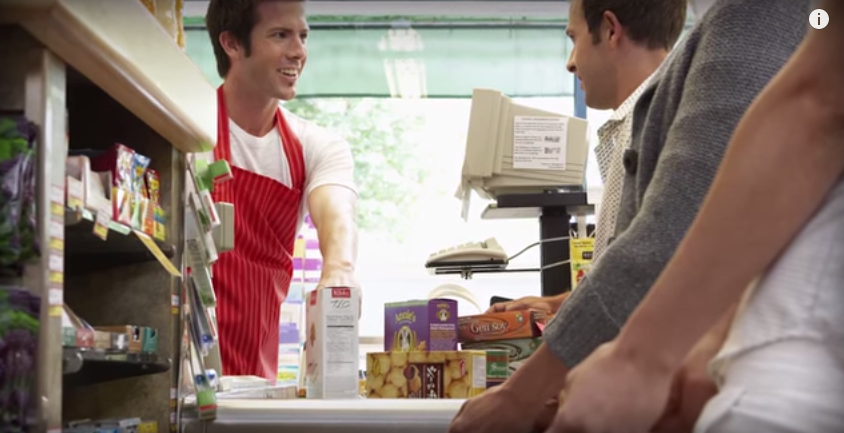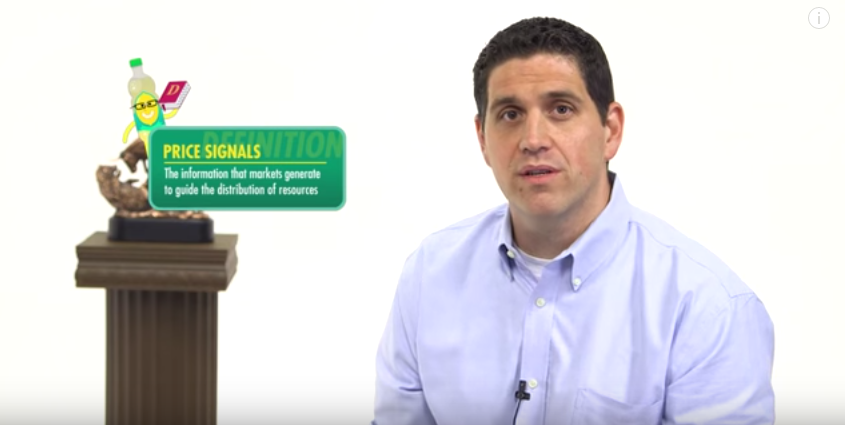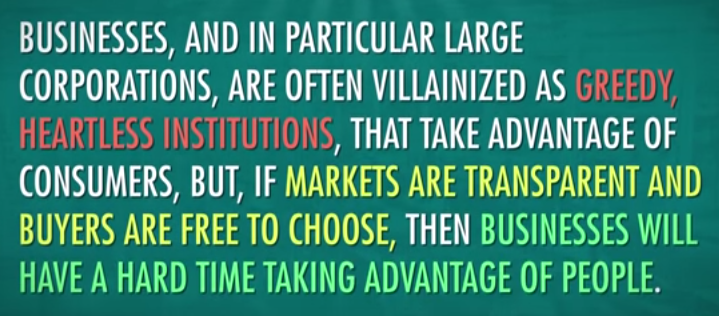After a very long break from the previous video (over 2 weeks), Crash Course released their fourth part of the economics series. This video was on supply and demand, and in this blogger’s opinion, contained both good and bad points.
What are Markets?
Crash Course begins the episode with defining what a market is:
A market is any place where buyers and sellers meet to exchange goods and services. The key to markets is the concept of voluntary exchange, that is that buyers and sellers willingly decide to make a transaction.

Let’s say you go to a farmer’s market and you buy a box of strawberries for $3. You value the box of strawberries more than the $3 you gave up to get it. The seller valued the $3 more than the box of strawberries. The transaction is a win-win because you got your strawberries and the farmers got their money.
This is a great point, but it’s not something too many people would disagree with. Crash Course’s really bold move came when they carried the principle of voluntary exchange to the labor market:

This same process happens in the labor market. Say that instead of the farmer’s market, you got your strawberries at the local supermarket. The cashier voluntarily decided to work there. He values the $10 an hour he makes there more than he does sitting at home, watching The Walking Dead. At the same time the owner of the store values the labor of the cashier more than the $10 an hour she pays him, and so it goes on and on up the chain of production, from the the driver that delivered the strawberries to the farmer that grew the strawberries to the tractor that the farmer purchased.
I say this is bold not because it’s wrong (I think it’s correct), but because it implicitly argues against the minimum wage, which prevents two people from making a voluntary exchange for labor that is less than than the decided minimum. The arguments in favor of a minimum wage state that some voluntary exchanges (in this case, labor for a cheaper price) do not make both parties better off, and it should be made illegal. In fact, some argue that these exchanges are in fact not voluntary at all and should be called “wage slavery,” which upon first listen, sounds pretty oxymoronic (i.e. slaves get wages?).
Efficient Markets

Crash Course also remarks on the efficiency of the market system:
Competitive markets turn out to be pretty great about allocating and distributing our scarce resources towards their most efficient use.
If farmers produced too many strawberries, then the price will fall as sellers try to sell them off. Lower prices means less profit to strawberry farmers, and those farmers will have an incentive to produce something else, like lettuce or brussels sprouts.
If farmers don’t produce enough strawberries, buyers will bid up the price and the farmers will have an incentive to produce more, which then drives down the price, and that’s like magic, except it’s not.
Very true, but I wish the video would have addressed the common arguments of central-planning advocates, namely when they believe that sellers charge too high of a price (which they refer to as “price gouging”) or too low of a price (which they refer to as “predatory pricing”). Even Mr. Clifford himself said that sometimes markets get things wrong, so why wouldn’t this be an example?
Crash Course may have given an answer to these objections in the current episode, albeit indirectly:

Businesses, and in particular large corporations, are often villainized as greedy, heartless institutions, that take advantage of consumers, but, if markets are transparent and buyers are free to choose, then businesses will have a hard time taking advantage of people.
In other words, prices are determined not to defraud or take advantage of the consumers, but because enough consumers value that product at that particular price.
Mr. Clifford even concludes this part of the video with a somewhat-snarky stab at general free market opponents:
If you really don’t like the policies or practices of a particular company, then don’t shop there. After all, in the free market, every dollar that is spent signals to producers what should be produced and how it should be produced.
This first part of the video was mostly great, stay tuned for future posts on the not-so-great parts of this video. Feel free to drop your thoughts on the video (or my critique of it) in the comments.